The 20x20 workspace hidden away in an auxiliary room situated within the $515 million expanse of Miami's Marlins Park isn't much.
There's room for a barber's chair, a mirror, a small workstation and enough free space for a couple of waiting customers.

But considering where Hugo Tandron started cutting hair when he was a young, street-wise know-it-all and considering the title that no one else in his line of work can lay claim to, his minimalist ballpark office, designated by the laminated piece of advertising affixed to the door, works just fine.
Next to the door, a small silver placard, reads "Barbershop."
Tandron's client list reads like a baseball version of Who's Who.
He has styled the hair of Hall of Famers like Hank Aaron, Tony Perez and Reggie Jackson and has bonded teams with matching hairstyles that inspired World Series championships.
More recently, Tandron created his version of a "Major League" Charlie Sheen-inspired cut for Marlins pitcher Ricky Nolasco, who sports a Mohawk with stripes shaved into the back.
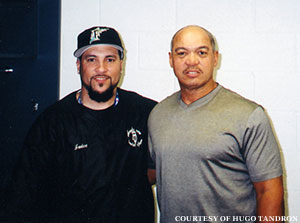
He concocted the "D-Double S" (David Samson Special) in honor of the no-fuss, clean-cut look he fashioned for the Marlins team president.
But in that 20x20 room that's similar to the space he has worked out of in the 14 years he's been the official barber of the Florida-turned-Miami Marlins, Tandron has carved out a life he never imagined.
He is the only officially sanctioned barber in the major leagues, cutting hair for a hometown team he proclaims matter-of-factly that saved his life. To suggest that a professional sports franchise could make such an impact on a 42-year-old man who never expected to live to see 23 seems like hyperbole.
Except in Tandron's case, it's not.
"Working for the Florida Marlins has changed my life," Tandron says. "Completely."
Of the more than 100 tattoos that permanently cover Tandron's body, one stands out.
All of the ink creations have meaning, Tandron says, each representing a piece of who he is. There's the barber pole and the pair of cutting shears that speak to the craft he's made a living at since he was 22. His childhood nickname, Juice, is printed on the side of his neck.
But there's one tattoo that will never be covered by an article of clothing, making the seven letters scripted in cursive right where his left eyebrow is supposed to be perhaps more special than any of the rest.
Blessed.
Tandron doesn't consider himself religious. But he is a believer. His mother, Zonia, a beautician by trade, used to pray to the heavens that her son would one day see the light.
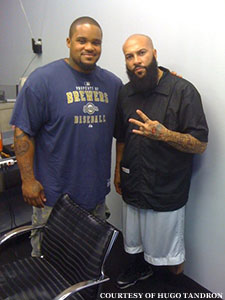
Tandron grew up in Carol City, Fla., an area of Miami where gang life and street violence prevailed, promising youngsters a direct path to Easy Street.
Growing up, Tandron admittedly tagged along with the wrong crowd, lured into trouble by influences he once believed he was destined to surrender to. One of those vices, he was convinced, would take his life sooner rather than later before he had time to make anything of himself.
"I always had that chip on my shoulder," Tandron says. "You couldn't be faster than me, you couldn't be stronger than me and you couldn't be badder than me. That's just how I was."
So his mother prayed.
She prayed hard, asking God to spare her son.
Tandron once spent a month in jail after being charged with armed robbery in 1990, a year after he was charged with assault and battery. This followed a habitual string of street fights and car thefts he and his friends took part in just for the hell of it all.
The second crime was the turning point after Tandron and two friends held up a South Beach liquor store. In one court appearance, Tandron spotted his father, Hugo Sr., seated in the courtroom gallery crying.
Hugo Sr. worked for Miami-Dade Water and Sewer and rarely showed emotion and never cried.
The sight of seeing tears come from his father was enough for Tandron to change his ways.
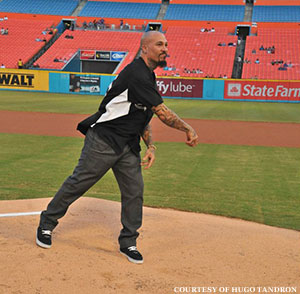
Charges in the case were dropped, giving Tandron a new outlook on life. Somehow, he had avoided serious jail time and had survived the streets, despite being nearly shot outside of a club and being spared only when the Tec 9 semiautomatic gun pointed straight at his face locked and failed to fire.
As much of a leader as Tandron made himself out to be, he learned how bad choices could have influenced his life.
"Looking back, I'm like, 'How stupid was I?'" Tandron says. "I had to change my life."
He just didn't know how.
But somehow his mother's prayers were answered, leading Tandron into a life-altering profession he had never seriously considered.
Even before the Marlins came into the picture, his skill with an electric trimmer likely saved his life.
"If it wasn't for cutting hair, I'd probably either be dead or in jail," Tandron says. "I always had faith that God had other plans for me than to be on the street."
As a young boy, Tandron would go to work with Zonia, learning the beauty shop routine that made up his mother's work-life existence. He watched her as she styled hair, noticing how she paid particular attention to each customer, making them feel special.
Tandron was 14 when he started cutting his own hair. If it were up to Zonia, he would have some straight-laced haircut rather than the one he could create himself by standing in front of a mirror and putting trimmer to his head.
He started small, etching numbers and Playboy bunnies into his hair -- and into that of his friends.
Before long, he was cutting hair for his entire neighborhood, charging $5 a head, working out of the small utility room in the back of his family's modest home.
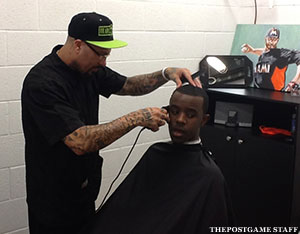
By the time he was 22, word of his styling skills started to expand beyond his neighborhood.
"You know who Gary Sheffield is, right?" one of his friends asked Tandron, referring to the former major league slugger, who at the time was making a name for himself with the hometown Marlins.
"Yeah, I know the dude," Tandron said.
"You want to cut his hair?"
"That's cool," Tandron replied.
Tandron had cut plenty of hair in his day so adding another haircut to his schedule wasn't a big deal.
Sheffield showed up, finding Tandron in his makeshift barbershop ready to work in that small back room where the customer sat in the chair and where the waiting room consisted of a washer and dryer to sit on top of.
Sheffield didn't seem overly fazed, tired of having his car broken into every time he went to get his haircut at a nearby flea market. But for Tandron, adding a big-name customer like Sheffield felt different.
"Here he is a big-time athlete going to somebody's house in the inner city," Tandron says. "It's like, 'What am I getting set up for?'"
Tandron quickly put Sheffield at ease and before long he was making the Marlins his business.
One customer became two.
Sheffield told teammate Jerry Browne. Two became three before Tandron's reputation as a quality barber spread throughout the Marlins' clubhouse. Livan Hernandez showed up. So did Edgar Renteria and Derrek Lee, continuing a trend that led to Tandron becoming the official barber of the Marlins in 1998.

There was something about Tandron that resonated with players. He knew his role. Despite an all-access pass that gave him free reign in the clubhouse and to the players he was around on a regular basis, Tandron never pressed. He never invaded players' personal space and never asked to be included when they would head to popular Miami nightspots once their workday was over.
"He's just a down to earth family guy," says Lee, the former Marlins first baseman who ended his career last year with Pittsburgh. "You see the tattoos and you think one thing and then you get to know him and he's a big teddy bear.
"But he cuts white guys, Dominicans, black guys -- he can cut everyone's hair and everyone's happy. That's why he does so well."
That takes us back to that 20x20 room, where major leaguers line up to have Juice cut their hair.
Afterward, they'll ask what they owe and Tandron tells them to pay what they think his work is worth.
Most hand him a folded up wad of cash, a method of payment barbers often refer to as blessings.
If the Marlins are playing at home, Tandron will be there, cutting anywhere from five to 20 heads over a span of five hours.
After Tandron finishes, players scribble a quick signature and a message on the wall, leaving the barber a reminder of who has stopped by for a visit. Many times, his reputation precedes them showing up.

"I'm sure if you ask anyone in the major leagues who Hugo is, they'll say, 'Oh yeah, he has cut my hair before'," Lee says. "But he kind of person who can bridge the gap between any two cultures just because he gets along with everyone."
The players come for the haircut and stick around for the conversation, talking about whatever comes to mind, bringing a taste of their hometown corner barbershop to their baseball place of business.
Tandron is at the center of it all.
It would be easy for Tandron to take this life for granted, getting caught up in an A-list clientele list and the money that comes with it. But for Tandron, it's never been about the cash, but instead, about the relationships he builds in the 20 minutes he has his customers in the chair.
"I just do so much -- it's not just cutting hair," Tandron says. "We're not just barbers – we're counselors, we're psychologists, we're friends -- it's a lot of things we are. But I never realized that when I first started cutting hair."
Tandron opened his own barbershop, Headz Up in nearby Hialeah, in 2002. By that time, he had been working on major leaguers for four years.
The shop employs 10 barbers, including Tandron's 23-year-old son, Willie, who started accompanying his father to the ballpark when he was 8.
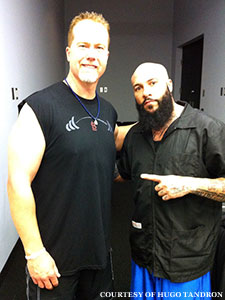
Willie is the manager of the shop, but Tandron is still the boss.
He hires many young barbers, choosing to mold eager learners rather than having to deal with attitudes he doesn't want to be part of his shop.
Among his barbers is Erron Evans, who goes by "Bigg Cutt." Tandron hired Evans after he had served 16 years in prison after being convicted on a home invasion charge.
Evans had learned to cut hair while behind bars and Tandron -- who himself was given a second chance in life -- believed those around him do, too. Tandron heard about Evans and told him to give him a call when he was released from prison.
A short time later, a spot opened up and Evans was hired.
Through his generosity, Tandron made Evans a believer, too.
"I'm not one of those holy-roller types," Evans said in an interview with Miami New Times in 2010. "But it feels like God reached through Hugo to help me out."
Willie manages the barbershop and has even picked up some of his father's major league clientele.
Tandron has passed his passion for cutting hair onto his son as a way of keeping Willie out of trouble. While Tandron is more precise with the clippers, Willie is more laid back. Willie has established his own style, but has learned hard work and humility from his father, who Willie says, hasn't taken a vacation in 12 years.

Willie, a former baseball player who traded in his big league dreams to follow in his father's line of work, believes he is learning from the best. Tandron's humble side amazes his son, but is just as much a part of him as is the styles he creates with his clippers.
Tandron understands his role and treats his millionaire ballpark clients no differently than he does those back at the barbershop he started back in 2002, where customers still pay $15 despite the celebrity status Tandron has attained since.
"He's not big headed, he's not arrogant, he's not rude to people, he doesn't throw his weight around," Willie Tandron says. "He's humble -- some people get a little bit of success and a little bit of fame and it goes to their head and they think their stuff don't stink."
Tandron's genuineness is one of the first things that major leaguers notice. As popular as he's become -- not only in the Marlins' clubhouse but also around baseball -- he treats each of his clients differently, make each feel as unique as the hairstyles Tandron creates for them.
That's when the blessings that Tandron speaks of start coming.
His first big tip came from former major leaguer Marquis Grissom, who handed Tandron a $100 tip after a ballpark haircut.
During the off-season, Felix Hernandez handed Tandron $800 for haircuts for him and his son. Once, Dodgers pitcher Brad Penny dropped $850 for Tandron to pop over to Vero Beach, Fla., during spring training -- to trim his beard.

Former Marlins pitcher Dontrelle Willis once rewarded Tandron with a classic 1974 Chevy convertible in mint condition -- his way of saying thanks to a barber that has also become a close friend.
The relationships, Tandron says, are what matter most. In the 20 minutes he has a customer -- ball player or otherwise -- in the chair, Tandron feels as if he is living life with purpose.
Some of his bigger clients fly him to Los Angeles and Washington, D.C., to cut their hair and during spring training, Tandron makes his way around the Grapefruit League in Florida, picking up blessings and making new friends wherever his clippers take him next.
Tandron is currently in discussions with cable networks regarding a reality show that would feature his Headz up shop, adding another possible project for him to attach his name to.
But none of his accomplishments or clients -- regardless of how big -- will change Tandron, who once worked two jobs, including overnight, to support his family before his barbershop took off.
"My dad always had the drive to do what he does and to make ends meet," Willie Tandron says. "I remember being a kid and we would struggle. We came up rough and we didn't have much.
"So to see my dad now and to see where he's at, it's incredible."
In a moment of reflection, Tandron points back to that one tattoo printed above his eye. There are days it's hard to imagine that he's come so far from the days when he fought and robbed his way around Carol City.
His life now is one built around peace, friendships and haircuts -- a life filled with contentment that came after Tandron changed his ways.
Ask him to describe his life in one word and he mentions those seven letters scripted on his face for all to see.
Blessed.
People find out what Tandron does for a living and the company he holds and they find it hard to believe. But for a man who traded anger and violence for a life of humility, Tandron says his life has nothing to do with luck.
"For me, it's not about the money and I stay grounded and I stay humble because there's no other way," Tandron says. "This is my passion -- it's what I do. It's what I live for. Some people have hobbies and I guess, my hobby is cutting hair -- you love seeing the satisfaction when you give someone a nice haircut.
"There's nothing better than that for me."
Blessed, indeed.
-- Email Jeff Arnold at jeff.arnold@thepostgame.com and follow him on Twitter @jeff_arnold24.
Popular Stories On ThePostGame:
-- LA-NY: History Of Championship Showdowns
-- The Exercise That Makes Body Fat Disappear
-- Hope Solo Welcomes New Love Interests
-- 3 New P90X Exercises That Blast Fat









